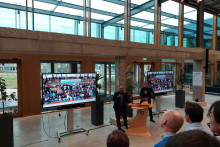With a draft bill on internationalization by outgoing Minister Dijkgraaf on the shelf, the topics of internationalization and the UT’s organisational language were on the University Council agenda on Wednesday. The following applies to both subjects: nothing has been agreed on or decided yet, but the Executive Board did give the University Council an insight into the path the UT is taking.
Rector Tom Veldkamp was levelheaded on the issue of internationalization, which has caused rumblings in The Hague politics in recent months. ‘We have to be realistic; times are changing. We do not want to hide behind exceptions in the law, but ultimately, it is up to the study programmes themselves to make the choices. This only concerns the bachelor’s programmes; the master’s degrees are not taken into account in the bill.’
‘No complete U-turn to Dutch’
For some bachelor’s programmes, it could mean that the new legislation forces them to adapt the language of instruction, Veldkamp suggested. ‘But that does not mean that these programmes make a complete U-turn to Dutch. This means that these programmes will offer a Dutch track, parallel to the English one, which is already being taught.’ According to the rector, this will not happen overnight. ‘It is a gradual change and I can imagine that different programmes maintain a different pace in terms of changes to language. Or that a programme will not change anything at all.’
Board president Vinod Subramaniam hinted that language education will not become a part of the curriculum. ‘That would be an unprecedented and irresponsible intervention by politicians to the curriculum’, said Subramaniam. ‘Language course will be extracurricular, both for an international student who wants to learn Dutch and for Dutch students who want to brush up on their English. We have courses and we have our own Language Centre, we consider expanding our offering.’
Parallel bilingualism
The Executive Board and the University Council also discussed the UT-wide language of instruction – or the ‘organizational language’. Which is based on an evaluation of the current language policy, with English as the official language since January 1st 2020. The decision of the Executive Board: as a result of that evaluation, a new language policy must be introduced based on ‘parallel bilingualism’. According to the Executive Board, this is what is most in line with current practice and the fundamental principles of the UT.
The University Council agreed with this without any resistance. The council did advice the Executive Board not to be guided by politicial discourse when drawing up a new language policy and that inclusion should be the leading principle. Sabin Kerwien Lopez (student fraction Ureka): ‘We see that the English language predominates in current practice, but we must be careful that we do not walk in the other direction with a new language policy. Dominance of one of the two languages will certainly not help in terms of inclusion.’
Board president Vinod Subramaniam agreed with that. But after his question about how the council envisions the implementation of parallel bilingualism, the discussion quickly bogged down. ‘It feels more like a problem on paper than a problem in practice’, concluded Campus Coalition member Emile Dopheide. To tackle that problem, the Executive Board promised that a new language policy will have some – three to five – basic principles. ‘Not too detailed and not too strict. We have to look at it pragmatically’, says Subramaniam.







